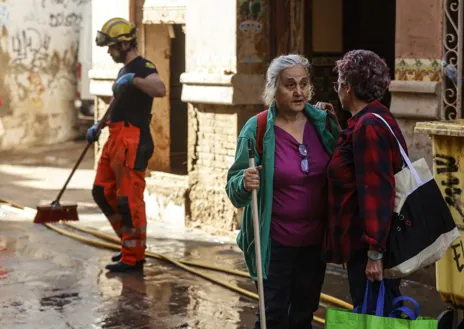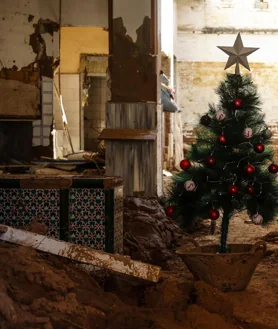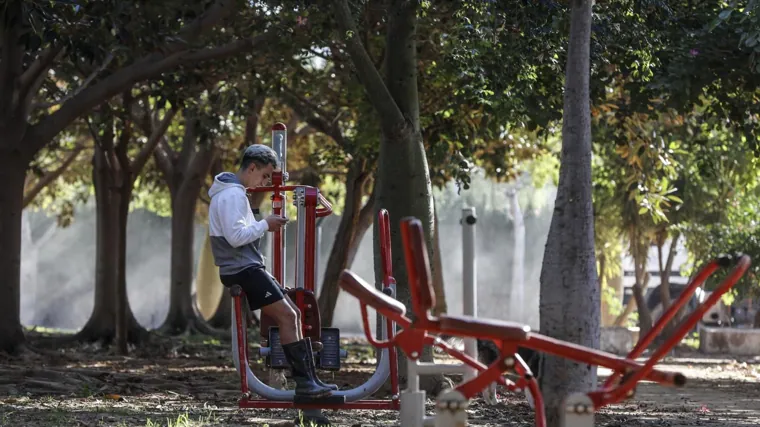The residents walk through clouds of dust, while the workers try, still without success, to erase the trace of earth that the flood left in its wake. There is electricity and drinking water, a luxury for many in the worst moments of the emergency. A month later, the cars and furniture destroyed by the flood no longer collapse the streets of Paiporta and Picaña, two of the municipalities hardest hit by the catastrophic DANA that devastated the province of Valencia. But the tragedy reached such dimensions that the situation remains critical in many other municipalities in the same region such as Catarroja, Algemesí, Sedaví, Alfafar, Benetússer or Massanassa. Behind closed doors, each family hides a different reality.
Sitting at the door of his house, right on the edge of the Poyo ravine, Agustín contemplates how the firefighters continue working in the area where The Army has installed a walkway so that the residents of Picaña can cross the riverbed to the other side of the town. It was the first bridge that the waterspout carried away that fateful afternoon of October 29.
“We don’t know anything yet,” says this 73-year-old man about the technicians’ visit to his home. The ravine left it without a façade on the ground floor, which has been shored up. He renovated it himself when he worked as a bricklayer and remembers that he reinforced the structure thoroughly. That’s why he thinks he has endured. Of his neighbors’ house, wall to wall, nothing has remained standing. Agustín and his wife saved their lives because they were able to go upstairs and now they live in their daughter’s house. «We lived well here, but now I don’t know. The water reached my neck. I thought he didn’t tell it,” she says through tears. “Many houses are going to be cleaned, but they are not going to rebuild them out of fear,” he explains. Yours is among the half a thousand properties evacuated due to the risk they present. More than a hundred have already been cataloged for demolition due to structural damage and around 1,600 do not, at the moment, meet the conditions to be inhabited again.
One of them is that of Carlos Pavia. His image full of mud pushing a cart with clothes became the cover of ABC on November 5. Beyond what money can replace, he could not save the memories he treasured as a great Valencia CF fan. Their home, just a few meters from the ravine in Picaña, is already clean of mud and belongings, but the humidity has colonized the walls of all the rooms. Mold makes the environment unbreathable. “I have asked for a budget and, without furniture, it will cost me almost 40,000 euros, taking into account that I am still paying the mortgage,” says this film locator who has worked for directors such as Alejandro Amenábar. “I had experienced tense situations due to natural phenomena before, on trips outside of Spain, but nothing like this,” he adds.
For now, he continues to assist his parents, also affected, in the processing of aid that arrives in dribs and drabs. Faced with the avalanche of requests, the Generalitat assures that it has already paid 20 million of the direct aid of 6,000 euros. Of the 214,000 applications received for damage to homes or cars, the Insurance Compensation Consortium, dependent on the Government, has disbursed more than 92 million.


In the photo above, Carlos Pavia, in his house in Picaña. Below, a firefighter and an affected woman carry out cleaning work in Paiporta. In the last image an improvised Christmas tree in a destroyed house in Paiporta
No time to grieve
In these four weeks, there has been time to mourn the dead while the mud was removed, but not to begin mourning. The official count of deaths has stopped at 222. Mortal victims have already been identified and have been buried in the cemeteries of the different affected municipalities. At the close of this edition, The search continues in Ramblas and in the Albufera lake to four missing people, three men and a woman who were lost a month ago. With any hope lost, their families want to find the bodies so they can rest in peace.
Petruta Sandu returned from Romania on Wednesday. There he buried his father and mother, Florin and Axinia, two of the names of the tragedy. He leaves behind an intense ten-day search through the Albufera Natural Park, where his parents lived, which ended in the worst possible way. The water reached eight feet in his house and they couldn’t escape. «Losing both at the same time is very hard. “They had to be here, playing with their one-year-old grandson,” laments Petruta.
«We are destroyed. They drowned because no one told them. I am very angry and consumed by pain. We are like zombies. We look in the mirror and we don’t recognize ourselves,” he asserts. A lawyer has advised them with the bureaucracy to repatriate the bodies, a process that they will now have to pay for with the help that arrives from the State. «Are they going to give us 72,000 euros to the families of the deceased? Based on what have they made that calculation? It’s a misery. We have even taken money from under the stones to give them a dignified farewell, the one that we Orthodox people usually do, watching over the bodies and accompanying them to the cemetery with music,” she says, very affected.

A young volunteer rests in a park in Picaña
The trauma of what has been suffered is mixed with the need to try to get up and move forward. Also with indignation and the feeling of abandonment by the institutions. «We have no shops, there are no banks, I can’t go have a coffee anywhere. I think that outside of here we are seeing, but not understanding, what we are experiencing. People don’t jump on the train tracks because there is no train, nor are there any tracks.», explains Mari Ángeles, a resident of Paiporta. «My father told me about the war. This is like a war without bombs. The first time I had to wait in line for food, I cried,” he adds. «We need to live our lives with psychological help. At night, I still hear the sound of water. Keep coming back to tell this. “Don’t forget us,” says Ana, who lives with her daughter due to the damage to her house.
These two friends collect basic products at one of the distribution points that bring together tons of solidarity coming from all over Spain. In recent days, supermarkets have begun to open in the town. About ten thousand schoolchildren, at the moment, They have not returned to the eighteen educational centers that remain closed at ground zero, while those who know that they will not be able to return to their school or institute are relocated because it will need to be rebuilt.
Mobility problems
The fear of night looting has decreased after the anxiety of the first days. On ground floors where until recently there were built-in vehicles, partitions have now been raised. Teams of workers try to extract the sludge accumulated in more than 600 garages and basements. Also a sewer collapsed due to mud and which raises fears for health.
With 120,000 cars stacked in fields and on the way to the scrapyard, mobility at ground zero has become a real puzzle for those who have to travel to work outside their municipality. While work continues to repair the few roads that have not been able to open to traffic, The lack of Metro and Cercanías trains is made up for with buses shuttle that seem “insufficient” for users.
The situation for many companies is also dramatic. More than 2,500 have requested a force majeure ERTE with 27,765 workers affected. The damage is multimillion-dollar in the industrial estates. Marian seems certain that He will raise the blinds of his Paiporta hardware store againbut you already know that some of the surrounding businesses, most of them self-employed, will not do so.
Amidst the drama, she has found her particular escape route to a reality that does not disappear, but from which she can escape for a few minutes a day on the terrace of her farm. “Paiporta, seen from above, remains the same.”
#Valencia #remains #emergency #month #DANA
